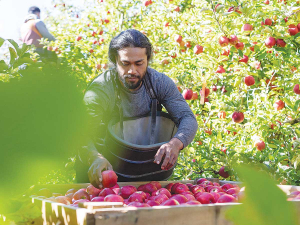M.I.A.
OPINION: The previous government spent too much during the Covid-19 pandemic, despite warnings from officials, according to a briefing released by the Treasury.
 Alan Pollard says border closures and a failure of government to recognise the Covid-free status of the Pacific Islands has led to critical worker shortages. Photo Credit: Paul Sutherland Photography.
Alan Pollard says border closures and a failure of government to recognise the Covid-free status of the Pacific Islands has led to critical worker shortages. Photo Credit: Paul Sutherland Photography.
A former horticulture sector leader believes New Zealand's Covid response should have been a joint public-private response from day one.
But a lack of willingness by the Government to engage means that, "we missed critical opportunities which would have meant an earlier and more effective response", says Alan Pollard, who recently stepped down as NZ Apples and Pears chief executive.
"If we could learn one thing from the pandemic response, it should be that government does not necessarily know best and that in times of crisis we should draw on expertise from across all sectors to produce the best outcome for all of us," he told Rural News.
Pollard says Covid has certainly been a game changer. He says as a food producer, the industrhy has always been focussed on food safety, sanitary systems, hygiene and the like.
"So, the Covid personal health and hygiene rules were already being practiced across the sector. Social distancing created some challenges for post-harvest operations, but the industry quickly adapted."
For Pollard, the biggest issue has been the impact of border closures, and more recently how New Zealand is being left behind with the rest of the world opening up.
"If the industry cannot have confidence in its future labour supply, investment will stall, businesses will retrench, jobs will be lost, and a large contributor to New Zealand's economic and social fabric will be put at risk. My personal opinion is that New Zealand's Covid response should have been a joint public-private response from day one."
In the last couple of years, the pandemic has created additional challenges for farmers.
Pollard says these include border closures, and a failure of governmenr to recognise the Covid-free status of the Pacific Islands, leading to a critical worker shortage that placed growers under huge pressure.
"Crops go unharvested, jobs are lost, grower businesses are put in jeopardy," he says.
Farming costs are rising at an alarming and unsustainable rate. These costs cannot be recovered in international markets. Pollard says grower mental health is now a massive issue, with growers faced with losing their livelihoods.
The Covid-related challenges come on top of other challenges facing orchardists over the years, like the vagaries of global markets.
Pollard points out that in the late 1990s the industry relied on a few varieties (Royal Gala and Braeburn) entering a few markets (UK and Europe). Today the industry has diversified, producing a basket of high value varieties going to over 80 markets around the world.
In the mid-2000s, the global fruit and vegetable sector came under huge pressure from lobby groups over the use of chemicals.
Pollard says the NZ industry invested heavily in a programme to remove harsh organophosphates instead of opting for soft targeted pesticides.
"Today NZ apples and pears have the lowest chemical residues of any fruit grown globally, largely undetectable," he says.
Food producing industries have been subject to increasing regulation, be it water use, environmental rules, health and safety, or food safety. Pollard says this adds huge complexity and cost to what should be a simple task of growing food.
Fonterra’s impending exit from the Australian dairy industry is a major event but the story doesn’t change too much for farmers.
Expect greater collaboration between Massey University’s school of Agriculture and Environment and Ireland’s leading agriculture university, the University College of Dublin (UCD), in the future.
A partnership between Torere Macadamias Ltd and the Riddet Institute aims to unlock value from macadamia nuts while growing the next generation of Māori agribusiness researchers.
A new partnership between Dairy Women’s Network (DWN) and NZAgbiz aims to make evidence-based calf rearing practices accessible to all farm teams.
Despite some trying circumstances recently, the cherry season looks set to emerge on top of things.
Changed logos on shirts otherwise it will be business as usual when Fonterra’s consumer and related businesses are expected to change hands next month.

OPINION: Here w go: the election date is set for November 7 and the politicians are out of the gate…
OPINION: ECan data was released a few days ago showing Canterbury farmers have made “giant strides on environmental performance”.